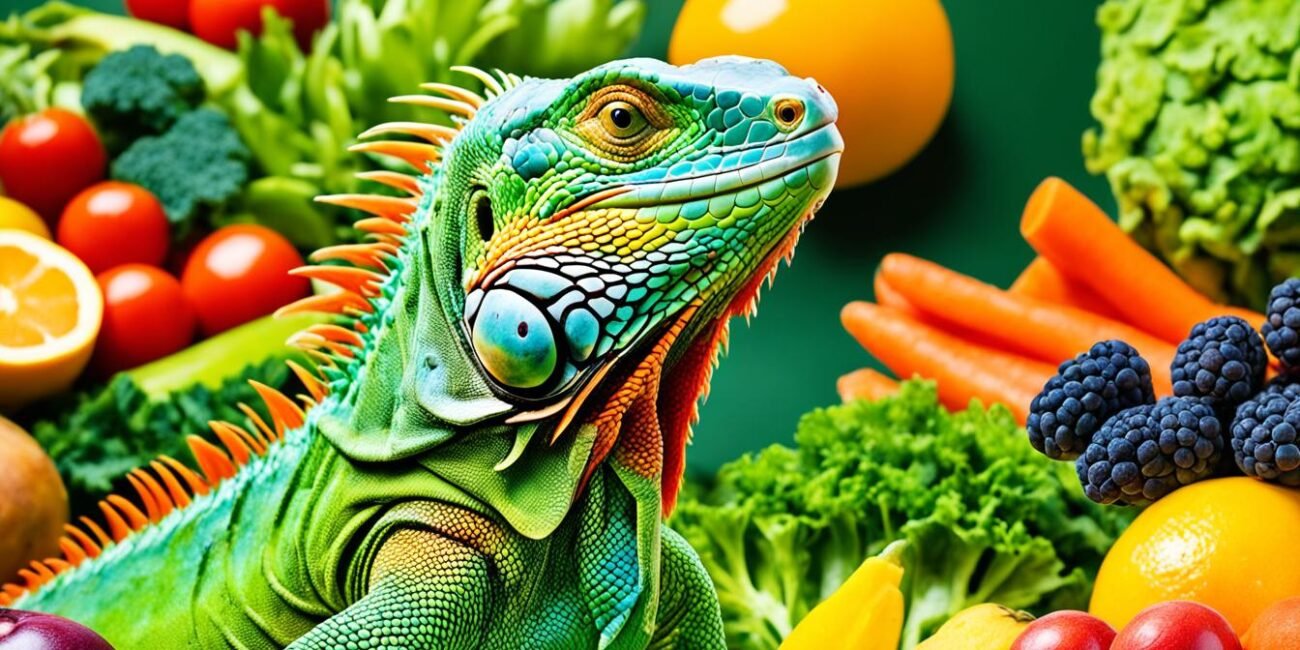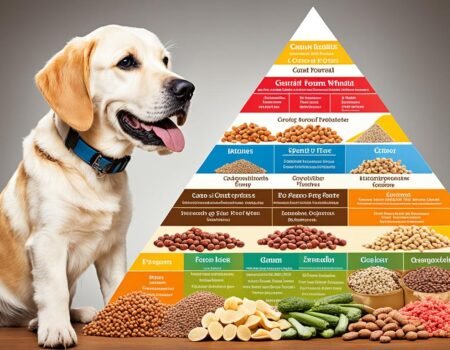Feeding your pet iguana the right diet is crucial for their overall health and well-being. While iguanas are primarily herbivorous, it’s important to provide them with a balanced and nutritious diet that meets their specific dietary requirements. This includes feeding them a variety of dark green leafy vegetables, calcium-rich vegetables, and limited fruits. Additionally, supplementing their diet with commercial food formulated specifically for iguanas can help ensure they receive the necessary nutrients.
Key Takeaways:
- Feeding your iguana a proper diet is essential for their health and longevity.
- Dark green leafy vegetables should make up the majority of their diet.
- Calcium-rich vegetables, such as collard greens and kale, should be included in their diet.
- Fruits should only be given sparingly as a treat.
- Supplementing their diet with commercial food formulated for iguanas is acceptable.
Recommended Iguana Food Brands
When it comes to providing your iguana with the best nutrition, choosing high-quality iguana food brands is crucial. These brands have been trusted by reptile enthusiasts and veterinarians alike for their commitment to providing top recommended iguana food choices. Let’s explore some of the most trusted iguana food options available:
Zoo Med
Zoo Med is a well-known brand in the reptile food industry. They offer a range of iguana foods that have been formulated by nutritionists to meet the specific needs of iguanas at different life stages. Their foods contain the correct ratios of calcium, protein, fiber, and other essential nutrients to support optimal health. Made with natural ingredients, Zoo Med iguana foods do not contain any artificial colors, flavors, or preservatives, ensuring the highest quality for your pet.
Mazuri
Mazuri is another top recommended brand for iguana food. They are known for their dedication to producing high-quality reptile food products. Mazuri’s iguana food is carefully formulated to provide a balanced diet for iguanas, taking into account their specific dietary requirements. With Mazuri, you can be confident that your iguana is getting the nutrition it needs to thrive.
OxBow
OxBow is a trusted brand that offers premium iguana food options. Their products are developed in consultation with veterinarians and nutritional experts, ensuring that they meet the highest standards of quality and nutrition. OxBow’s iguana food provides a complete and balanced diet, promoting overall health and well-being for your pet.
By choosing one of these high-quality iguana food brands, you can be confident that you are providing your pet with trusted iguana food options. Remember to carefully read the feeding instructions and consult with a veterinarian for specific recommendations based on your iguana’s individual needs.
Proper Diet for Iguanas
Feeding your pet iguana a proper diet is essential for its health and well-being. As herbivores, iguanas mainly consume plant material, and it’s crucial to provide them with a balanced diet that meets their nutritional needs. Here’s a breakdown of the recommended diet for iguanas:
- Dark Green Leafy Vegetables: 80-90% of an iguana’s diet should consist of dark green leafy vegetables. These include collard greens, kale, and spinach. These vegetables are rich in essential nutrients, including calcium and fiber, which are vital for an iguana’s overall health and growth.
- Fruits: Fruits should make up less than 20% of an iguana’s diet. They should be given sparingly as treats due to their higher sugar content. Some suitable fruits for iguanas include strawberries, papaya, and melons.
- Calcium-Rich Vegetables: To promote healthy bone development, it’s important to include calcium-rich vegetables in an iguana’s diet. Collard greens, kale, and broccoli are excellent sources of calcium.
- Other Vegetables: In addition to dark green leafy vegetables, iguanas can also benefit from the inclusion of other vegetables in their diet. This can include cactus, bell peppers, and carrots, which provide added nutritional variety.
Incorporating commercial food specifically formulated for iguanas into their diet is acceptable, but it should make up no more than 5-10% of the total diet. These food options are designed to provide the necessary vitamins and minerals that iguanas require for optimal health.
It’s important to note that the proper diet for iguanas may vary based on factors such as age, size, and overall health. Consult with a veterinarian for specific recommendations tailored to your pet iguana’s needs.
Recommended Iguana Food Brands
| Brand | Description |
|---|---|
| Zoo Med | Zoo Med offers a range of iguana foods formulated by nutritionists to meet the specific dietary needs of iguanas. Their products contain the essential nutrients required for healthy growth and development. |
| Mazuri | Mazuri is known for its high-quality reptile food products. Their iguana food options are carefully formulated to provide the necessary vitamins and minerals for optimal iguana health. |
| OxBow | OxBow manufactures premium reptile food products, including options designed specifically for iguanas. Their products are made with high-quality ingredients to ensure the nutritional needs of iguanas are met. |
Feeding Schedule for Iguanas
Feeding your iguana according to a regular schedule is essential for their health and well-being. While the frequency of feeding may vary depending on the age and weight of your iguana, here are some general guidelines to help you establish a feeding routine:
Young Iguanas:
Young iguanas require more frequent feeding compared to adults due to their rapid growth and metabolism. It’s recommended to feed them daily to ensure they receive the necessary nutrients for development.
Adult Iguanas:
Adult iguanas can be fed either daily or every other day, depending on their body condition. If your iguana is overweight, feeding them every other day can help manage their weight. However, if they are at a healthy weight, daily feeding is suitable.
When feeding your iguana, it’s important to offer small portions of food at a time. This helps prevent waste and allows for proper digestion. Remember that iguanas are selective eaters, and offering a variety of food options can encourage a balanced diet.
Additionally, providing fresh clean water at all times is crucial for the hydration of your iguana. They may drink from the water bowl and also use it to bathe, which aids in maintaining their skin health.
| Feeding Schedule for Iguanas | Age | Frequency |
|---|---|---|
| Youth | 0-1 year | Daily |
| Adult | 1+ years | Daily or every other day |
Calcium and Vitamin Supplements for Iguanas
Iguanas have a higher requirement for dietary calcium than phosphorus. Proper supplementation is crucial to ensure their nutritional needs are met. Here are some recommendations for calcium and vitamin supplements for your iguana:
1. Calcium Powder
Lightly sprinkle a growing iguana’s food every other day with calcium powder specifically formulated for reptiles. This will help provide the necessary calcium for strong bones and overall health. Make sure to choose a high-quality brand that is trusted by reptile experts.
2. Multivitamin Supplement
Young iguanas may benefit from a multivitamin supplement containing vitamin D. Vitamin D helps with calcium absorption and aids in the proper development of their skeletal system. Administer the multivitamin according to the manufacturer’s instructions and consult with a reptile veterinarian for specific recommendations.
3. Supplements for Adult Iguanas
Adult iguanas should be given a calcium supplement once to twice per week. Additionally, a multivitamin with vitamin D should be administered twice a month. These supplements ensure that adult iguanas maintain their calcium levels and receive the necessary vitamins for optimal health.
To ensure your iguana consumes the supplements, dust them onto small portions of their food and feed that portion first. This will help ensure they consume the necessary nutrients before filling up on other food.
It is important to choose trusted iguana food options and popular iguana food brands when selecting supplements for your pet. Here are some of the reputable brands known for their high-quality reptile products:
| Recommended Iguana Food Brands | Description |
|---|---|
| Zoo Med | Zoo Med offers a range of iguana foods formulated by nutritionists to meet the specific dietary needs of iguanas. Their products contain the right balance of calcium, protein, fiber, and other essential nutrients. |
| Rep-Cal | Rep-Cal offers a variety of calcium and vitamin supplements specifically designed for reptiles. Their products are trusted by reptile enthusiasts and are formulated to ensure proper nutrition for iguanas. |
| Exo Terra | Exo Terra is a reputable brand known for its high-quality reptile products. They offer calcium and vitamin supplements that can support the health and well-being of your iguana. |
Remember to consult with a reptile veterinarian for specific recommendations on the best supplements for your iguana and the appropriate dosage based on their age and overall health.
Feeding Guidelines for Iguanas
When it comes to feeding your iguana, offering a balanced and varied diet is essential to promote their overall health and well-being. Here are some feeding guidelines to ensure your iguana receives the necessary nutrients:
Dark Green Leafy Vegetables
Dark green leafy vegetables should make up the majority of your iguana’s diet. These vegetables are packed with essential vitamins and minerals that are necessary for their growth and vitality. Some recommended options include:
- Collard greens
- Kale
Additional Vegetables
In addition to dark green leafy vegetables, you can include other vegetables to provide variety in your iguana’s diet. Consider adding the following vegetables:
- Cactus
- Broccoli
- Bell peppers
Limit Fruits
Fruits should only make up a small portion of your iguana’s diet and should be offered sparingly as a treat. While iguanas enjoy the sweetness of fruits, they are high in natural sugars and should be consumed in moderation. Some suitable fruits include:
- Papaya
- Mango
- Strawberries
Commercial Food Options
Adding commercial canned or pelleted food formulated specifically for iguanas can be beneficial in providing essential nutrients. These high-quality iguana food brands offer a convenient way to supplement your iguana’s diet. Recommended iguana food brands include:
| Brand | Description |
|---|---|
| Zoo Med | Formulated by nutritionists to meet the specific nutritional needs of iguanas at different life stages. |
| Mazuri | Known for their high-quality reptile food products, Mazuri offers a range of options for iguanas. |
| OxBow | A trusted brand that provides nutritionally balanced food for various reptiles, including iguanas. |
Avoid Nutrient-Deficient Vegetables
Not all vegetables are suitable for iguanas, as some may be nutrient-deficient or harmful to their health. It’s important to avoid feeding your iguana vegetables such as iceberg lettuce, spinach, and rhubarb, as they lack the necessary nutrients or contain substances that may be toxic to iguanas.
Remember, providing a varied diet that includes dark green leafy vegetables, additional vegetables, limited fruits, and occasional commercial food will help ensure your iguana receives the essential nutrients they need to thrive.
Protein Foods for Iguanas
Foods high in animal-based protein should be limited for iguanas. It’s essential to provide them with a balanced diet that consists mainly of plant material. However, a small amount of protein can be included in their diet. Here are some protein foods that you can offer to your pet iguana:
- Crickets: Offer crickets in small quantities, making sure they do not exceed 5% of the total diet. They are a good source of protein and can provide variety in your iguana’s meals.
- Mealworms: Similar to crickets, mealworms can be given as a protein-rich treat. Remember to keep the portion size small, as they should not make up a significant part of your iguana’s diet.
- Pinky Mice: Pinky mice can be offered to young, growing iguanas in small amounts, up to 10% of their diet. However, it’s crucial to limit the intake of pinky mice and monitor your iguana’s overall health and weight.
While it’s acceptable to include these protein foods in your iguana’s diet, it’s essential to avoid certain foods that are unsuitable for their digestive system. Dog and cat food, for example, should not be fed regularly as they contain excessive amounts of protein, vitamin D, and fat, which can be harmful to iguanas.
Remember, the majority of your iguana’s diet should consist of plant material. These protein foods should only be offered in small quantities as part of a well-balanced diet. The recommended iguana food brands mentioned in this article provide excellent options to meet your iguana’s nutritional needs.
Take a look at the table below for a quick summary of the protein foods suitable for iguanas:
| Protein Foods | Recommended Quantity | Notes |
|---|---|---|
| Crickets | Less than 5% of the total diet | Good source of protein, offer variety |
| Mealworms | Small amounts as a treat | Provide occasional protein-rich treat |
| Pinky Mice | Up to 10% of the diet for young, growing iguanas | Monitor overall health and weight |
Consult with a veterinarian for specific recommendations on the ideal protein intake for your pet iguana.
Water Needs for Iguanas
Fresh clean water is essential for keeping your iguana hydrated and healthy. Iguanas not only drink from their water bowl but also enjoy bathing in it, as they absorb water through their skin. To ensure proper hydration, it’s recommended to provide both drinking water and misting them with water a few times a week.
When it comes to water bowls, it’s important to choose a heavy one that won’t easily tip over. This helps prevent accidental spills and keeps the water clean. Remember to change the water and clean the bowl daily to maintain hygiene.
During the dry winter months, misting your iguana with a water sprayer can help keep them hydrated. This is especially important as the dry air can lead to dehydration. Mist the enclosure a few times a week, allowing the water to settle on the surfaces, including the plants and the iguana’s skin.
Remember, adequate water intake is crucial for the overall health and well-being of your iguana. Make sure to monitor their water consumption and hydration levels closely.
Considerations for Iguana Nutrition
The nutritional needs of iguanas are still an area of ongoing research, and opinions may vary. It’s important to discuss your pet iguana’s specific nutritional needs with a veterinarian. Factors such as age and overall health can affect their dietary requirements. Proper nutrition is crucial for the overall health and longevity of iguanas, and regular veterinary care is recommended to ensure they are receiving the appropriate diet and supplementation.
Consulting with a Veterinarian
When it comes to providing the best iguana food options, seeking professional guidance from a veterinarian is essential. They have the expertise and knowledge to assess your iguana’s individual needs and recommend high-quality iguana food brands that align with their nutritional requirements. A veterinarian can provide personalized guidance based on your iguana’s age, health condition, and any specific dietary restrictions.
Nutritional Significance
Proper nutrition is crucial for the health and well-being of iguanas. An imbalanced diet can lead to various health issues, including metabolic bone disease, obesity, and malnutrition. Providing your iguana with a well-rounded and nutritious diet is vital in preventing these problems.
Dietary Adjustments
As iguanas grow and age, their nutritional needs may change. It’s important to make dietary adjustments accordingly. Young iguanas require higher levels of protein and calcium for growth and development, while adult iguanas may benefit from a slightly different nutrient composition to support their overall health. Consulting with a veterinarian will help ensure that you are providing the best iguana food options throughout the various stages of your pet’s life.
Feeding Practices
Feeding iguanas should be done with care and attention to detail. It’s crucial not to overfeed or underfeed your iguana, as both can have negative consequences on their health. Follow the recommended feeding schedule provided by your veterinarian and ensure that you are offering a balanced diet consisting of a variety of vegetables and limited fruits. Avoid feeding your iguana unhealthy or inappropriate food items, as they may lead to digestive issues or nutritional deficiencies.
Remember, each iguana is unique, and their nutritional requirements may vary. Working closely with a veterinarian and investing in high-quality iguana food brands will help you provide the best nutrition for your beloved pet.
| Considerations for Iguana Nutrition | |
|---|---|
| Consulting with a Veterinarian | Seek professional guidance for personalized recommendations |
| Nutritional Significance | Proper nutrition is vital for iguana health and well-being |
| Dietary Adjustments | Adapt the diet as iguanas grow and age |
| Feeding Practices | Carefully follow feeding guidelines and offer a balanced diet |
Conclusion
Providing a proper diet is essential for the health and well-being of iguanas. Feeding them a variety of dark green leafy vegetables, calcium-rich vegetables, and limited fruits is key. Supplementing their diet with commercial food formulated specifically for iguanas is also acceptable. It’s important to monitor their weight, adjust the feeding schedule accordingly, and provide fresh clean water at all times. Consult with a veterinarian for specific recommendations on diet and supplementation for your pet iguana.
FAQ
What should an iguana’s diet consist of?
An iguana’s diet should consist primarily of plant material, with 80-90% of the diet being dark green leafy vegetables. Fruits and other vegetables should make up the remaining portion of the diet.
Are there any recommended brands for iguana food?
Yes, some recommended brands for iguana food include Zoo Med, Mazuri, and OxBow. These brands offer high-quality reptile food products that meet the nutritional needs of iguanas.
How often should I feed my iguana?
Most young iguanas should be fed daily, while adult iguanas can be fed daily or every other day if they are overweight. It’s important to monitor their weight and adjust the feeding schedule accordingly.
Should I provide supplements for my iguana?
Vitamin and mineral supplements may be necessary, especially for young iguanas. Calcium and vitamin D are important for their growth and development. Consult with a veterinarian for specific recommendations on supplementation.
What foods should I avoid feeding my iguana?
Foods high in animal-based protein, such as dog and cat food, should be limited for iguanas. These foods contain too much protein, vitamin D, and fat for their dietary needs.
How important is water for iguanas?
Water is crucial for iguanas, as they not only drink from the water bowl but also bathe in it. Reptiles absorb water through their skin, so it’s important to provide fresh clean water at all times.
Are there any considerations to keep in mind when it comes to iguana nutrition?
It’s important to offer a varied diet to ensure that iguanas receive a balance of nutrients. Most of the diet should consist of dark green leafy vegetables, with fruits being given sparingly as a treat. Avoid nutrient-deficient vegetables and provide fresh, organic produce if possible.
How can I ensure that my iguana is receiving proper nutrition?
Consult with a veterinarian who specializes in reptile care to discuss your pet iguana’s specific nutritional needs. They can provide guidance on diet, supplementation, and overall care to ensure your iguana is healthy and thriving.










No Comment! Be the first one.